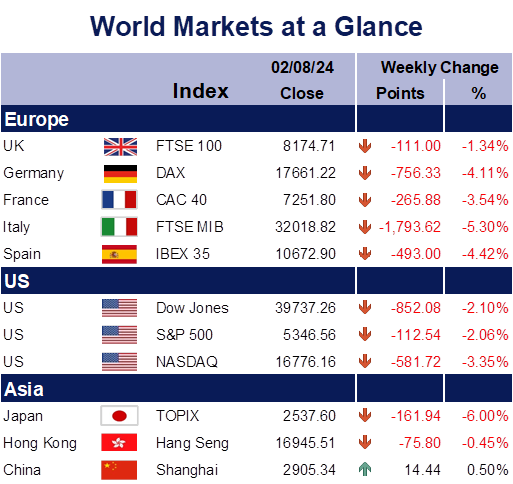Attention then shifted to the Bank of England (BoE) on Thursday. After holding rates steady since August 2023, the Monetary Policy Committee narrowly voted—five to four—to cut interest rates by 0.25%, bringing them down to 5.00%. This decision follows inflation returning to the Bank’s 2% target in May and remaining steady in June. The rate cut offers relief to millions of borrowers, including mortgage holders, who have felt the pressure of rate hikes since the Bank began its fight against inflation in December 2021. Governor Andrew Bailey signalled a cautious approach, suggesting that a rapid return to the ultra-low interest rates seen post-global financial crisis is unlikely. Nevertheless, this policy moderation is viewed as a positive step, likely to bolster consumer and business confidence and foster a more supportive environment for economic growth through the remainder of the year.
Towards the end of the week markets digested a rise in US unemployment claims and PMI reports indicating a contraction in manufacturing activity weighed on markets. The unemployment rate rose to 4.3% in July 2024 from 4.1%, while the economy added just 114,000 jobs in July, well below forecasts of 175,000. These signs of cooling in the labour market following the Fed’s decision to hold raised market concerns that policymakers may now be behind the curve, with their next policy meeting not until September. However, it’s important to highlight that the market has also consistently misjudged central banks outlook on policy and its key to remember policymakers are looking out for consistency in the data and emerging trends to base their decisions, rather than reports in isolation.
Markets sold off capping a volatile week. It’s important to remain focused on the long-term perspective. Market volatility is a natural part of investing, and our highly diversified portfolios are designed to enhance downside protection, even in challenging conditions. Markets have historically sold off when investors believe central banks haven’t acted as expected. While we expect this volatility to be short-lived, it may persist into August due to lower trading volumes during the summer break, with investors likely taking up positions in September. Rest assured, our experienced investment management team is continuously monitoring the markets and stands ready to capitalise on opportunities as they arise. Short-term dips in valuations can often present attractive entry points for long-term investors, which can help drive higher performance over time.
While market fluctuations can be unsettling, they are also a normal part of the journey toward achieving your financial goals. Remember, it’s about time in the market, not timing the market.
Looking ahead, next week brings US Services PMI, UK retail sales, and key economic data from China, including balance of trade and inflation figures.
Kate Mimnagh, Portfolio Economist



